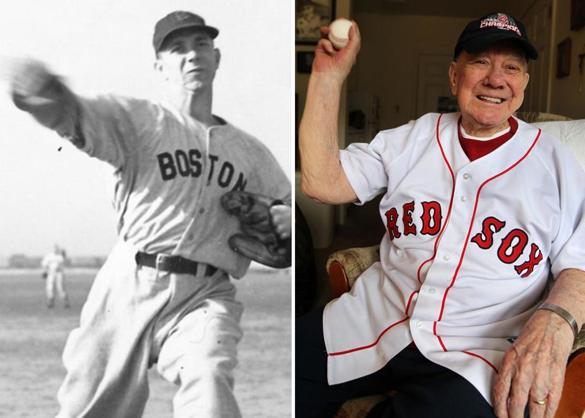It is with great sadness that I report the passing of Lou Lucier on October 18, 2014. His obituary and arrangements are included in the following link:
http://www.legacy.com/obituaries/telegram/obituary.aspx?n=louis-lucier&pid=172868747&fhid=25322
Mr. Lucier was one of the finest gentlemen I have ever interviewed. I treasure my memory of the afternoon I describe in the feature below.
*******************************************************************************************
I spent Saturday afternoon talking baseball with Lou Lucier who pitched for the Boston Red Sox in 1943 and 1944. I don’t think there could be a better way to brighten a gloomy January day than to hear stories about major league baseball during World War II, and to listen to first-hand memories of Joe Cronin, Bobby Doerr and former Red Sox owner Tom Yawkey.
 At age 94, Lou Lucier may have lost a step running to first base but he still knows his way around the pitching mound. Lou took a baseball and showed me how he gripped it and discussed the mechanics of his curve ball with authority.
At age 94, Lou Lucier may have lost a step running to first base but he still knows his way around the pitching mound. Lou took a baseball and showed me how he gripped it and discussed the mechanics of his curve ball with authority.
“I always gripped my fastball and curve ball exactly the same,” he emphasized while demonstrating his grip, “because those coaches in the other dugout are watching every move you make. If you change your grip at all for the curve, they’ll pick up on it and let the batter know what’s coming.”
Lou acknowledged that his curve ball was his out-pitch. “When the count got to 3-2, the batter would be expecting a fastball and I would break off my curve. It would be coming in high, right where the batters liked it. But then it would break low and they would either swing and miss it, or pop it up,” he recalled with delight.
Lou Lucier played seven seasons of professional baseball but he is very humble about his achievement. Several times during our discussion he referred to himself as, “Just a pitcher from the Blackstone Valley League.” The Blackstone Valley League was a strong semi-pro consortium that included cities and towns from Worcester in the north to Pawtucket, RI, in the south. The league produced a number of major league ballplayers including Hall of Fame members Gabby Hartnett and Hank Greenberg.
Lou grew up a Red Sox fan and he remembers traveling to FenwayPark with family members as a youngster. “I’ve always been a Red Sox fan,” Lou says proudly. He politely declined to assess the 2012 Red Sox.
After two outstanding seasons pitching in the Red Sox minor league system at Canton, OH (23-5), and Louisville, KY (13-9), Lou was summoned to a meeting at FenwayPark before the 1943 season. “I met with the owner Mr. Yawkey, Eddie Collins [General Manager], and Joe Cronin [player-manager].” Shaking his head in wonderment, Lou says, “Here I am sitting with three people who I never expected to meet, and they’re telling me they want me to report to spring training and play for the Red Sox.”
Even better than meeting with three future Hall of Fame members, the Red Sox paid Lou a $1,000 cash bonus as an inducement to sign for the 1943 season. “My wife [Marcella] and I stopped for a steak dinner on the way home,” he remembers, relishing the memory.
After pitching in two relief appearances to begin the 1943 season, Lou started and completed a 4-2 win over the Chicago White Sox on May 16 at ComiskeyPark. Two weeks later he made his first start at FenwayPark and earned a 5-1 complete game win against the Detroit Tigers. Asked if the win at Fenway was the highlight of his big league career, Lou answers, “No, it was that first win over the White Sox because then I felt I belonged in the major leagues.”
After his fast start, Red Sox pitching ace Tex Hughson told manager Joe Cronin, “That guy [Lucier] is going to be our next twenty-game winner.” But a chronically sore shoulder prevented Lou from full fulfilling Hughson’s prediction. “To be honest, I’m not sure how I came down with the sore shoulder,” Lou says. “I thought I might have picked up during spring training. But I will never know for certain.”
Lou recalls that he pitched with pain throughout his major league career. He pitched in 16 games for the Red Sox in 1943 but he was limited to 3 appearances with the team in 1944. Towards the end of the 1944 he picked up by the Philadelphia Phillies, and he pitched for the Phillies in 13 games in 1945, his final season in the big leagues.
Lou remembers Red Sox manager Joe Cronin with fondness. “He was a terrific manager and everyone who played for him felt the same way,” Lou remembers. But his warmest words are for former teammate Bobby Doerr. “Bobby was wonderful to me. He was my roommate and when I was pitching he would sit beside me between innings and tell me about the batters I would be facing in the next inning. He’s a great guy.”
Bobby Doerr is the oldest living member of baseball’s Hall of Fame. But his former roommate Lou Lucier has him beat as the oldest Red Sox player. Lou will turn age 95 next March 23, but Bobby won’t catch him until he reaches age 95 on April 7.

After spending an afternoon with Lou and having interviewed Bobby Doerr many times over the years, I can tell you that if there was a “Hall of Fame of Gentlemen,” Bobby Doerr and Lou Lucier would be charter members!
To read more about the delightful Lou Lucier, follow this link to read Stan Grossfeld’s excellent feature from The Boston Globe of March 27, 2012: http://www.boston.com/sports/baseball/redsox/articles/2012/03/27/ex_red_sox_lou_lucier_94_still_follows_team/


Leave A Comment